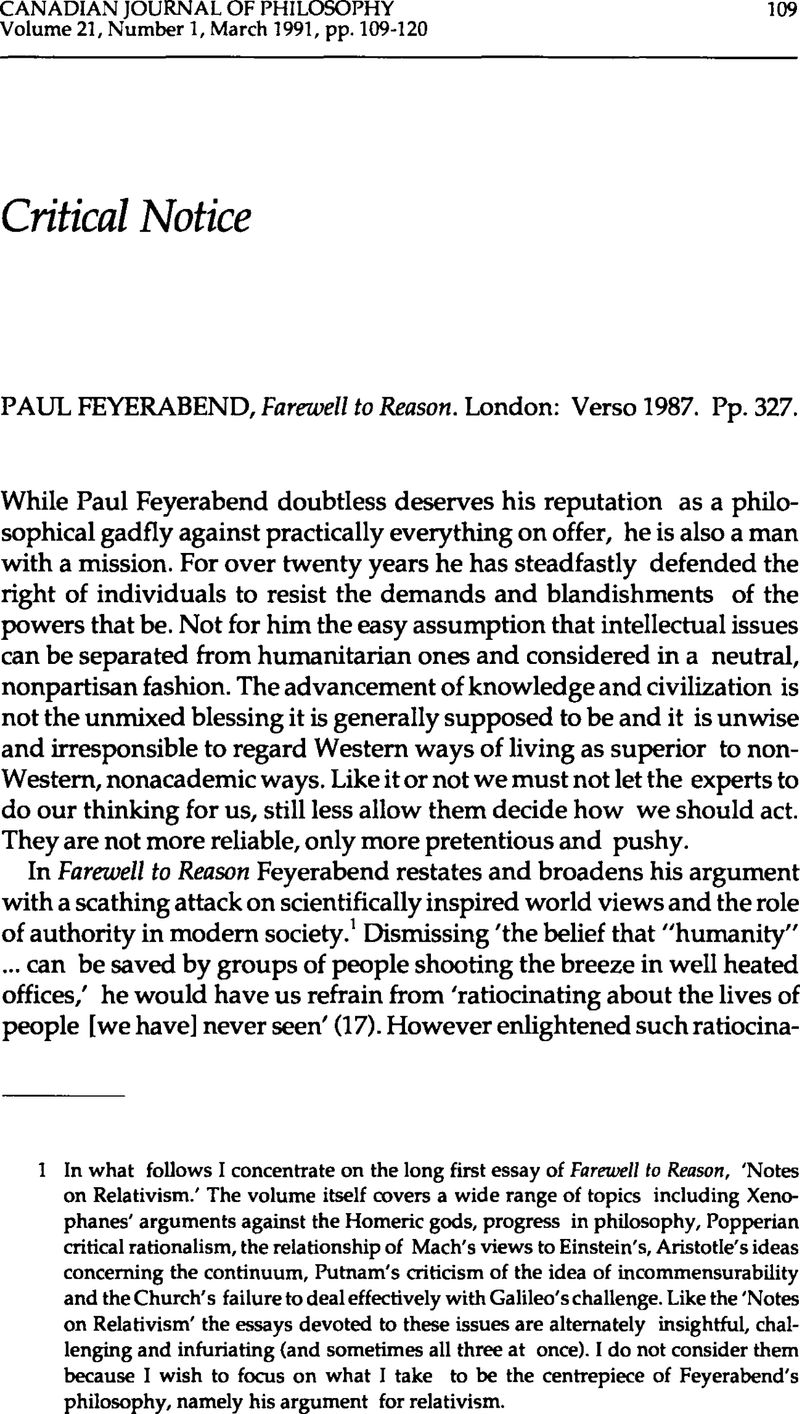Published online by Cambridge University Press: 01 January 2020

1 In what follows I concentrate on the long first essay of Farewell to Reason, ‘Notes on Relativism.’ The volume itself covers a wide range of topics including Xenophanses’ arguments against the Homeric gods, progress in philosophy, Popperian critical rationalism, the relationship of Mach’s views to Einstein’s, Aristotle’s ideas concerning the continuum, Putnam’s criticism of the idea of incommensurability and the Church’s failure to deal effectively with Galileo’ s challenge. Like the ‘Notes on Relativism’ the essays devoted to these issues are alternately insightful, challenging and infuriating (and sometimes all three at once). I do not consider them because I wish to focus on what I take to be the centrepiece of Feyerabend’s philosophy, namely his argument for relativism.
2 Compare Feyerabend’s discussion of John Stuart Mill’s argument in his ‘immortal essay On Liberty’ (33-4). According to Feyerabend, this argument prefigures his own but one may be forgiven for wondering whether Mill would have agreed that differences of opinion should be vigorously promoted and traditions accorded equal opportunities and rights. The idea that ‘a variety of views … is needed for the production of “well-developed human beings” [and] for the improvement of civilization’ (33) is a far cry from the radical pluralism that Feyerabend advocates.
3 Also, how clear is it that ‘the history of science is full of theories which were pronounced dead, then resurrected’ (33)? The more plausible view would seem to be that the number of theories that stage comebacks is rather small and that those that do come back mostly do so in quite different forms.
4 Here my point is that Feyerabend frequently expresses himself as being content with science as presently practised and that he is led by the logic of his position to do so. I am aware that he is also critical of much scientific research and that he even goes so far as to argue that scientists are responsible for the havoc wreaked by the application of their theories (see esp. 299).
5 Admittedly Feyerabend allows that ‘tyrannical action’ may be appropriate in exceptional circumstances (see 28). However, since he is in no position to distinguish between beneficial tyrannical actions and harmful ones masquerading as ‘exceptions,’ this concession amounts to very little. Obviously it is no help to argue that ‘local consultation should be carried out as far as possible and … resumed the moment the danger recedes,’ this being something to which most tyrants are only too willing to agree.
6 Here I focus on Feyerabend’ s main argument. There are also a number of passages in the ‘Notes on Relativism’ —still to be considered— that suggest a very different view of the matter.
7 Even at his most relativistic, Feyerabend is prone to backtrack and to offer what for all the world look like reasons. Thus he no sooner dismisses the invitation to take a stand concerning concentration camps as ‘quite idiotic— I sing my aria, the Nazi sings his’ than he points out that ‘Auschwitz is an extreme manifestation of an attitude that still thrives in our midst … in the treatment of minorities … in education … in the nuclear threat … in the killing of nature [and so on]’ (313).
8 Significantly, Feyerabend is at pains to remind us that ‘telling the truth usually means telling what happened in a particular situation,’ that ‘there are cases where a witness can give an answer and would be rightly called a liar if he said that he did not know,’ that we can justifiably ‘speak of real things despite all the illusions an inventive magician might conjure up’ and that ‘it makes sense to say that the room in which I am now sitting is real but the room in which yesterday, in a dream, I saw an elephant riding on a sparrow was not’ (63; see also 49 and 64). When considering these matters it is especially important to remember that rationalism is a philosophical theory, not a restatement of what everyone knows. One does not become a rationalist simply by referring to reason or by expressing an interest in the various ways in which individuals attempt to figure out how things work and how best to cope.
9 Consider, for instance, his confident view that we would be far better off if ‘scientists … had no greater influence than plumbers’ and ‘important decisions [were] made … by “the people” themselves’ (55, 62). Unfortunately, Feyerabend frequently writes in a manner which — to use one of his own phrases— ‘sounds impressive but gives no hints of what the implications for the real world are supposed to be’ (277; see also 142).
10 I should also stress it is a mistake to think of tradition as necessarily coercive and antithetical to reason. While some traditions do indeed call for compliance and subservience, many do not. After all, reasoning may itself be usefully regarded as a tradition and it is not in the least improper to speak of traditions of criticism and protest.
11 In writing this paper I have benefited from H. Duncan’s and M.H. Wilson’s comments.